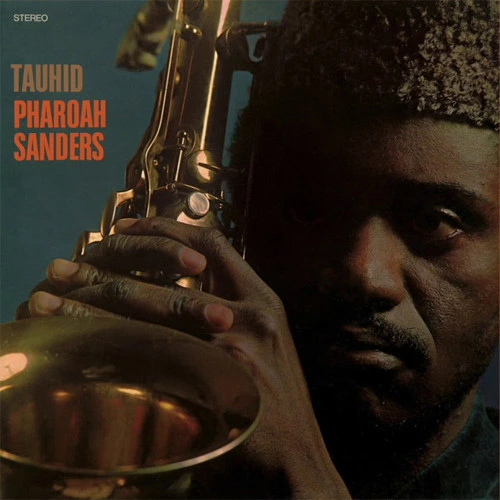Astral Jazz On Vinyl LP!
Includes The Magnificent "Upper Egypt And Lower Egypt"!
Pharoah Sanders possesses one of the most distinctive tenor saxophone sounds in jazz. Harmonically rich and heavy with overtones, Sanders' sound can be as raw and abrasive as it is possible for a saxophonist to produce. Yet, Sanders is highly regarded to the point of reverence by a great many jazz fans. He made his name with expressionistic, nearly anarchic free jazz in John Coltrane's late ensembles of the mid-'60s. The hallmarks of Sanders' playing at that time were naked aggression and unrestrained passion. In the years after Coltrane's death, however, Sanders explored other, somewhat gentler and perhaps more cerebral avenues without, it should be added, sacrificing any of the intensity that defined his work as an apprentice to Coltrane.
Coltrane's ensembles with Sanders were some of the most controversial in the history of jazz. Their music represents a near total desertion of traditional jazz concepts, like swing and functional harmony, in favor of a teeming, irregularly structured, organic mixture of sound for sounds sake. Strength was a necessity in that band, and as Coltrane realized, Sanders had it in abundance.
Sanders made his first record as a leader in 1964. Tauhid is his first album after the death of John Coltrane in 1967.
"Tauhid marks the 1966 Impulse debut of tenor saxophonist Pharoah Sanders, who had already gained fame as a flame-throwing saxophonist of the 'new thing' playing with John Coltrane. However, Sanders' tenor appearance doesn't saturate the atmosphere on this session; far from it. Sanders is content to patiently let the moods of these three pieces develop, whether it be through the percussion of Roger Blank and Nat Bettis, guitarist Sonny Sharrock, or his own piccolo. For those looking for Sanders' patented screeching tenor throughout, Tauhid will disappoint." - Al Campbell, allmusic.com
"'Upper Egypt And Lower Egypt' is so perfect that the rest of Tauhid tends to get forgotten, but the four shorter tracks which complete the album, totalling another 18:08, are also magnificent. 'Japan,' inspired by Sanders' tour of the country with Coltrane's band in the summer of 1966, is as pretty as pink lotus blossom. 'Aum' and 'Venus,' the first with Sanders on alto, are tougher and further out, before the concluding 'Capricorn Rising' re-establishes the album's peaceful opening vibe... In retrospect, the first cut was indeed the deepest, and for many devotees Tauhid remains Sanders' astral jazz muthalode, and 'Upper Egypt And Lower Egypt' his finest (quarter) hour." - Chris May, All About Jazz
"No longer bothered by the restrictions of convention, Sanders travels a course of rhythm here that re-appropriates its structure with every introduction of a new and different instrument. 'Upper and Lower Egypt' are forceful currents of hybridized energy, combining a skilled and disciplined structure in playing and a wild and unfettered sense of rhythm. Unregulated by any constrictive ideas of musical communications, Sanders performs with the abandon of an artist who is perfectly willing to let anyone sit down at his table, provided that they eat what is being served with a clean palate and an open mind." - Imran Khan, Pop Matters
Features:
Vinyl LP
Musicians:
Pharoah Sanders, tenor saxophone, alto saxophone, piccolo, voice
Dave Burrel, piano
Henry Grimes, bass
Sonny Sharrock, guitar
Roger Blank, drums
Nat Bettis, percussion
Selections:
1. Upper Egypt And Lower Egypt
2. Japan
3. Medley: Aum / Venus / Capricorn Rising
Includes The Magnificent "Upper Egypt And Lower Egypt"!
Pharoah Sanders possesses one of the most distinctive tenor saxophone sounds in jazz. Harmonically rich and heavy with overtones, Sanders' sound can be as raw and abrasive as it is possible for a saxophonist to produce. Yet, Sanders is highly regarded to the point of reverence by a great many jazz fans. He made his name with expressionistic, nearly anarchic free jazz in John Coltrane's late ensembles of the mid-'60s. The hallmarks of Sanders' playing at that time were naked aggression and unrestrained passion. In the years after Coltrane's death, however, Sanders explored other, somewhat gentler and perhaps more cerebral avenues without, it should be added, sacrificing any of the intensity that defined his work as an apprentice to Coltrane.
Coltrane's ensembles with Sanders were some of the most controversial in the history of jazz. Their music represents a near total desertion of traditional jazz concepts, like swing and functional harmony, in favor of a teeming, irregularly structured, organic mixture of sound for sounds sake. Strength was a necessity in that band, and as Coltrane realized, Sanders had it in abundance.
Sanders made his first record as a leader in 1964. Tauhid is his first album after the death of John Coltrane in 1967.
"Tauhid marks the 1966 Impulse debut of tenor saxophonist Pharoah Sanders, who had already gained fame as a flame-throwing saxophonist of the 'new thing' playing with John Coltrane. However, Sanders' tenor appearance doesn't saturate the atmosphere on this session; far from it. Sanders is content to patiently let the moods of these three pieces develop, whether it be through the percussion of Roger Blank and Nat Bettis, guitarist Sonny Sharrock, or his own piccolo. For those looking for Sanders' patented screeching tenor throughout, Tauhid will disappoint." - Al Campbell, allmusic.com
"'Upper Egypt And Lower Egypt' is so perfect that the rest of Tauhid tends to get forgotten, but the four shorter tracks which complete the album, totalling another 18:08, are also magnificent. 'Japan,' inspired by Sanders' tour of the country with Coltrane's band in the summer of 1966, is as pretty as pink lotus blossom. 'Aum' and 'Venus,' the first with Sanders on alto, are tougher and further out, before the concluding 'Capricorn Rising' re-establishes the album's peaceful opening vibe... In retrospect, the first cut was indeed the deepest, and for many devotees Tauhid remains Sanders' astral jazz muthalode, and 'Upper Egypt And Lower Egypt' his finest (quarter) hour." - Chris May, All About Jazz
"No longer bothered by the restrictions of convention, Sanders travels a course of rhythm here that re-appropriates its structure with every introduction of a new and different instrument. 'Upper and Lower Egypt' are forceful currents of hybridized energy, combining a skilled and disciplined structure in playing and a wild and unfettered sense of rhythm. Unregulated by any constrictive ideas of musical communications, Sanders performs with the abandon of an artist who is perfectly willing to let anyone sit down at his table, provided that they eat what is being served with a clean palate and an open mind." - Imran Khan, Pop Matters
Features:
Vinyl LP
Musicians:
Pharoah Sanders, tenor saxophone, alto saxophone, piccolo, voice
Dave Burrel, piano
Henry Grimes, bass
Sonny Sharrock, guitar
Roger Blank, drums
Nat Bettis, percussion
Selections:
1. Upper Egypt And Lower Egypt
2. Japan
3. Medley: Aum / Venus / Capricorn Rising



 Turntable Accessories
Turntable Accessories Headphone Accessories
Headphone Accessories Cable Accessories
Cable Accessories Vinyl Accessories
Vinyl Accessories Compact Disc Accessories
Compact Disc Accessories







